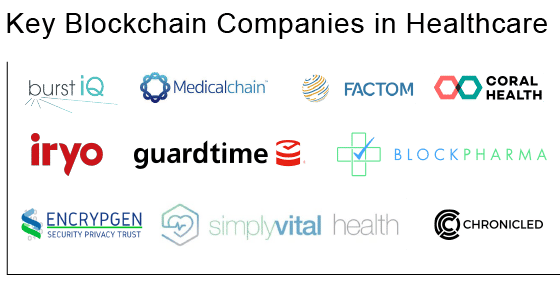How Blockchain is Transforming the Healthcare Industry?
Apr 06, 2022
Table of Contents
“Blockchain” is one of the most popular catchwords in the world of medical technology. A blockchain is a distributed method for producing and storing data records. It keeps a digital ledger of linked “blocks” of data that reflect how data is transferred, updated, or accessed on its peer-to-peer network. Blockchain technology is also known as Digital Ledger Technology (DLT).
Blockchain is a relatively new and rising technology with creative possibilities in healthcare implementation. Smooth, fast data exchange and delivery among all significant network members and healthcare providers contribute to the development of cost-effective medications and advanced treatments for a wide range of diseases. Furthermore, Blockchain technology will hasten healthcare expansion in the future years because this field directly impacts living quality, and it is one of the first areas where digital transformation improves and innovations occur. Moreover, several companies such as BurstIQ, Medicalchain, Factom, Guardtime, Iryo, Chronicled, EncrypGen, SimplyVital Health, Blockpharma, Coral Health, and others are also trying to implement blockchain technology to cement their position in the fast-growing healthcare domain.

With each passing day, Blockchain healthcare companies are coming up with new and innovative solutions to bring substantial change in healthcare and thereby providing exceptional value in the services. Improving transparency among various stakeholders such as patients, physicians, specialists, diagnostic labs, insurance companies, and others, is one of the major benefits of blockchain in healthcare.
A Blockchain system operates on top of the internet, on a peer-to-peer network of computers that all execute the protocol and have an identical copy of the transaction ledger, enabling P2P value transactions without the use of an intermediary by machine consensus. Blockchain technologies are classified as public, private, hybrid, or consortium. Each Blockchain network has unique benefits and drawbacks that determine its best uses.

Blockchain in Healthcare – Major Advantages and Issues
In the field of healthcare, the urgency of development is increasing at a breakneck pace. Today, there is a demand for high-quality healthcare facilities that are backed by innovative and cutting-edge technology. Blockchain would play a significant role in revolutionizing the healthcare sector in this case. The advantages of using blockchains over traditional methods of healthcare database management systems include decentralized management, immutable databases, data provenance, traceable data, robust data, and the availability of data to any authorized user while keeping it out of the hands of unauthorized users through encryption based on a patient’s private key.
However, there are major concerns about blockchain technology use in healthcare. These issues include:
- Security of network infrastructure at all levels
- All participants’ identities are verified and authenticated.
- Patterns of authorization to access electronic health information that is consistent
Furthermore, DLT may be used in various healthcare settings, although not every healthcare activity is tied to transactions. However, because the data in public blockchains are readily available, they cannot be utilized to store sensitive information such as identifiable health data. This transparency requires providers to examine privacy problems in order to ensure protected health information (PHI).
Moreover, while blockchain technology provides built-in security against some sorts of attacks, it is vulnerable to others. The blockchain code makes it vulnerable to zero-day attacks, vulnerabilities, and social engineering. As a result, information security must be prioritized, especially when employed in healthcare. As blockchain data is unchangeable, it should not be utilized indiscriminately in healthcare. Large files or those that change often may be excluded. All personally identifiable information should be kept off the chain.
Blockchain Applications in Healthcare
Blockchain applications in healthcare will not need to operate any differently than blockchain applications in other fields. A blockchain is a digital ledger that stores a shared record of transactions. These transactions are immutable, which means they cannot be updated or amended in any manner.

Notably, there is no requirement for a centralized authority, and no participant in the blockchain is required to have a prior relationship with another. An insurer, for example, may acquire access to a patient’s medical information housed in a hospital’s EMR system (with the patient’s agreement) even if the insurance had never before engaged with the hospital. The fundamental need is that the blockchain network first confirms the insurance and hospital.
Some of the major blockchain applications in healthcare include:
Store Information of an Individual Patient
A substantial amount of patient information and health data is produced both before and during the various clinical research phases. Several blood tests, quality assessments, estimations, and wellness surveys are available, and they can provide results indicating the presence of a document or record. Healthcare practitioners will browse the recorded data and suspect its legitimacy, which they will validate by matching it to the original information kept on the Blockchain system. Blockchain is built on current cryptographic techniques, including a suitable cryptographic foundation for data exchange. The healthcare professional records the patient’s name, date of birth, diagnosis, therapies, and ambulatory history in EHR format during patient details. This data is saved in cloud computing or current databases.
Display Information
The Blockchain system will disclose information about the medication’s origins to ensure excellent quality and that the licensed medicine manufacturer supplies it. If utilized correctly, blockchain provides stronger safety for sensitive data than ever before. Numerous industries, including banking, retail, and immobilization, have begun to leverage the Blockchain app trend to show information and gain several benefits. Healthcare is likewise seen as intricate and complex, and this proclamation will spark heated debate. Due to its intricacy and complexity, the market has undergone fundamental advances in various domains, including pharmaceutical products, drugs, vaccines, clinical trials, and cloud computing usage.
Safety and Transparency
It delivers outstanding safety and transparency while allowing doctors to dedicate more time to patient care. It would also make it possible to fund clinical research and remedies for any rare disease. Smooth data interchange across medical solution providers can help to improve diagnostic precision, efficient therapeutics, and cost-effective ecosystems in a healthcare system. For improved safety and transparency, blockchain lets multiple health ecosystem organizations to stay in touch and share information on a single distributed leader. When employing such a system, users may trade and monitor their data and other operations without looking for additional solutions for integrity and confidentiality.
Blockchain improves overall patient safety, tackles medicine validity and drug traceability issues, and enables safe interoperability. It is the only method to replace the current supply chain management strategy and prevent counterfeit medication makers from bringing safer pharmaceuticals to market, regardless of medical facilities and organizations. Blockchains would enable all data to be kept in a single area.
Health Record Keeping
Blockchain has the potential to be an ideal technology for medical record-keeping. Its uses include the exchange of healthcare data, the storage of electronic health records, the management of insurance, and the performance of administrative activities. Patients can use an app to communicate their health information to a Blockchain network. Digital Blockchain contracts facilitate sensor and intelligent device collaboration. In most situations, electronic health records are disseminated throughout several healthcare facilities. Blockchain will consolidate all facts and allow patients to access past data. The collection of all data in one location will provide us with fresh insights into a patient’s health state. As a result, the Blockchain paradigm will assure the information’s authenticity and legitimacy while protecting users’ privacy.
Clinical Trials
Blockchain Technology is utilized in clinical studies to overcome issues such as misleading findings and data disintegration that do not meet the research’s intentions and objectives. Clinical trials will benefit from increased confidence as a result of blockchain technology. The business analysis tool explores changing market dynamics to help the healthcare industry comprehend the possibilities. Medicine management on the Blockchain is another opportunity to establish and monitor the chain from the manufacturer to the client by using Blockchain credibility. Clinical trials is one of the key areas where Blockchain healthcare companies are actively trying to come up with new solutions to strengthen their position and market share.
Identification of False Content
Blockchain will improve clarity and the detection of fraudulent material. Clinical trials for participants and clients should continue to be simple to validate. An intelligent agreement is perfect for acquiring permission and keeping protocol documents and their conclusions available to public scrutiny. The technology initially enabled the general public to watch what happens in a clinical study carefully. This technology aims to be user-friendly and provide patients with secure real-time access to their health and insurance details.
Patient Monitoring
The confidence of a Blockchain enables medical providers to guarantee access to medical equipment when required. Doctors may also watch patients and react distantly to health-related problems. Monitoring temperatures within patient rooms, bed utilization, and supply availability may all be improved using Blockchain and healthcare. A Blockchain healthcare network designed to empower healthcare organizations and providers with a stable digital identity. Combines Blockchain and IoT technology to improve supply chain responsiveness and traceability, making healthcare logistics more transparent for effective patient monitoring.
Minimize Data Transformation Time and Cost
Blockchain networks reduce the amount of time and money spent on data transformation. Blockchain networks have the potential to solve the problem of quick and accurate verification of medical qualifications. Blockchain networks ensure patient anonymity and security. This will result in important new ideas and discoveries that have the potential to revolutionize the way healthcare is delivered throughout the world. Blockchain implementation will result in valuable and privacy-protected monetized data sharing networks. Blockchain is a distributed network computer system that allows stored time-stamped transaction history and documentation. Each node in this network validates and records each data input.
Maintain Financial Statements in Hospitals
It is critical to preserve an accurate record of the financial statements in the accounting process. The clinical trials are well-suited for seamless operation and evaluation, and Blockchain companies have developed solutions for simplifying the accounting and reporting processes in this area. Everyone may use this application to prepare for a visit to a health care professional and complete the necessary papers ahead of time, and it will save them time because they will not have to wait in line. However, we can learn about the hazards and advantages of Blockchain through its actual applications and the kind of issues it solves in the healthcare system.
Safeguarding Genomics
Genetic data theft has become a severe problem, with so many companies offering DNA sequencing to individuals. Blockchain technology can help to avoid this, and it can even be used to create an online marketplace where scientists can acquire genetic data for research reasons. This might encourage safe selling and reduce the need for costly middlemen.
Blockchain applications in healthcare are still in their infancy. Ethereum and Hyperledger Fabric are two examples of blockchain technology frameworks that are now in use on a modest scale. Blockchain services might be utilized to improve healthcare data management with increased blockchain security and systems that support synchronized transactions.
Way Ahead
Blockchain technology is being implemented in the healthcare sector, where special issues must be handled. The main issue with using this modern technology in medical institutions is a lack of knowledge. Blockchain applications are still in their infancy and require further work for technological study and development. It does, however, apply to the duties of medical associations and authorities. The moment has arrived to reform the healthcare system. Blockchain in healthcare is quite likely to grow in the future. Its uses in healthcare will improve due to this technical advancement since it aids in explaining developments and progress in the treatment process. Blockchain technology is essential for confirming transactions and information exchanges.
Transactions can be validated and published utilizing Blockchain technology in the upcoming day, with the approval of network members. As the cornerstone of a new generation of health information exchange, blockchain will guarantee numerical security to the patient level through public and private key encryption. This technology promises to treat patient records, prevent infringement, increase interoperability, rationalize procedures, regulate medicines and prescriptions, and monitor medical and supply chains. With the active participation and the growing interest of the tech giants in the segment, the application of blockchain in healthcare is expected to grow immensely in the coming years.
Downloads
Article in PDF
Recent Articles
- Wearing Technology to stay fit
- CDC study reveals; Jevtana receives yes; Herantis secures; Immuno-oncology is not cost-effective
- Japan is transforming its Healthcare sector through Regenerative Medicine
- Narcolepsy: Treatment options and market outlook
- The State of Alternative Medicine In The Healthcare



